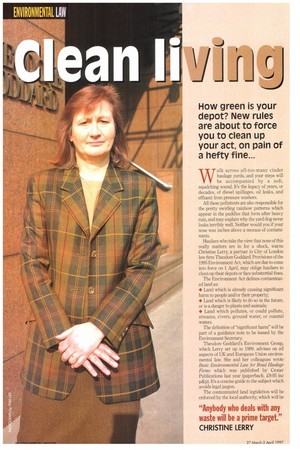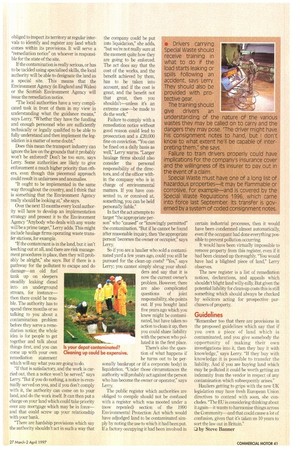How green is your depot? New rules are about to
Page 42

Page 43

If you've noticed an error in this article please click here to report it so we can fix it.
force You to clean up your act, on pain of a hefty fine...
Walk across all-too-many cinder haulage yards, and your steps will be accompanied by a soft, squelching sound. It's the legacy of years, or decades, of diesel spillages, oil leaks. and effluent from pressure washers.
All these pollutants are also responsible for the pretty swirling rainbow patterns which appear in the puddles that form after heavy rain, and may explain why the yard dog never looks terribly well. Neither would you if your nose was inches above a morass of contaminants.
Hauliers who take the view that none of this really matters are in for a shock, warns Christine Lerry, a partner in City of London law firm Theodore Goddard.. Provisions of the 1995 Environment Act, which are due to come into force on 1 April, may oblige hauliers to clean up their depots or face substantial fines.
The Environment Act defines contaminated land as: • Land which is already causing significant harm to people and/or their property;
+ Land which is likely to do so in the future, or is a danger to plants and animals;
• Land which pollutes, or could pollute, streams, rivers, ground water, or coastal waters.
The definition of "significant harm" will be part of a guidance note to be issued by the Environment Secretary.
Theodore Goddard's Environment Group, which Lerry set up in 1989, advises on all aspects of UK and European Union environmental law. She and her colleagues wrote Basic Environmental Law for Road Haulage Firms which was published by Croner Publications last year (paperback, £9.95 inc p&p). It's a concise guide to the subject which avoids legal jargon.
The contaminated land legislation will be enforced by the local authority, which will be obliged to inspect its territory at regular intervals to identify and register any land which comes within its provisions. It will serve a "remediation notice on whoever is responsible for the state of the site.
If the contamination is really serious, or has to be tackled using specialised skills, the local authority will be able to designate the land as a special site. This means that the Environment Agency (in England and Wales) or the Scottish Environment Agency will issue the remediation notice.
"The local authorities have a very complicated task in front of them in my view in understanding what the guidance means," says Lerry. "Whether they have the funding and enough personnel who are sufficiently technically or legally qualified to be able to fully understand and then implement the legislation is a matter of some doubt."
Does this mean the transport industry can ignore the law on the grounds that it probably won't be enforced? Don't be too sure, says Lerry, Some authorities are likely to give enforcement a much higher priority than others, even though this piecemeal approach could result in unfairness and anomalies.
"It ought to be implemented in the same way throughout the country, and! think that is something that the Environment Agency really should be looking at," she says.
Over the next 15 months every local authority will have to develop an implementation strategy and present it to the Environment Agency "Anybody who deals with any waste will be a prime target," Lerry adds. This might include haulage firms operating waste transfer stations, for example.
"If the contaminant is in the land, but it isn't leeching out at all, and there are risk management procedures in place, then they will probably be alright," she says. But if there is a pathway for the pollutant to escape and do damage—an old fuel tank up on sleepers steadily leaking diesel into an underground stream, for instance— then there could be trouble. The authority has to spend three months or so talking to you about a contamination problem before they serve a remediation notice; the whole idea is for people to get together and talk about things first, and you can come up with your own remediation statement which will say what you are going to do.
"If that is satisfactory, and the work is carried out, then a notice won't be served," says Lerry. "But if you do nothing, a notice is eventually served on you, and if you don't comply with it, the authority can come on to your land, and do the work itself. It can then put a charge on your land which could take priority over any mortgage which may be in force— and that could screw up your relationship with your bank.
"There are hardship provisions which say the authority shouldn't act in such a way that
11111111
Is your depot con Cleaning up could the company could be put into liquidation," she adds, "but we're not really sure at the moment quite how they are going to be enforced. The act does say that the cost of the works, and the benefit achieved by them, has to be taken into account, and if the cost is great, and the benefit not that great, then you shouldn't—unless it's an extreme case—be made to do the work."
Failure to comply with a remediation notice without good reason could lead to prosecution and a £20,000 fine on conviction. "You can be fined on a daily basis as well," Lerry warns. "Larger haulage firms should also consider the personal responsibility of the directors, and of the officer within the company who is in charge of environmental matters. If you have consented to, or connived at. something, you can be held personally liable."
In fact the act attempts to target "the appropriate person" who "caused" or "knowingly permitted" the contamination. "But if he cannot be found after reasonable inquiry, then 'the appropriate person' becomes the owner or occupier," says Lerry.
So if you are a haulier who sold a contaminated yard a few years ago, could you still be pursued for the clean-up costs? "Yes," says Lerry; you cannot simply shrug your shoulders and say that it is now the current owner's problem. However, there are also complicated questions of joint responsibility, she points out. If you bought land five years ago which you knew might be contaminated, but have taken no action to clean it up, then you could share liability with the person who polluted it in the first place.
There's also the question of what happens if he turns out to be personally bankrupt or (if a corporate body) in liquidation. "Under those circumstances the authority will probably act against the person who has become the owner or operator," says Lerry.
The public register which authorities are obliged to compile should not be confused with a register which was mooted under a (now repealed) section of the 1990 Environmental Protection Act which would have adjudged land to be contaminated simply by noting the use to which it had been put. If a factory occupying it had been involved in taminated? be expensive. certain industrial processes, then it would have been condemned almost automatically, even if the occupant had done everything possible to prevent pollution occurring.
It would have been virtually impossible to remove property from this register, even if it had been cleaned up thoroughly "You would have had a blighted piece of land," Lerry observes.
The new register is a list of remediation notices, declarations, and appeals which shouldn't blight land willy-nilly. But given the potential liability for clean-up costs this is still something which should always be checked by solicitors acting for prospective purchasers of property.
Guidelines
"Remember too that there are provisions in the proposed guidelines which say that if you own a piece of land which is contaminated, and you give somebody the opportunity of making their own investigations into it, then they buy it with knowledge," says Lerry. "If they buy with knowledge it is possible to transfer the liability. And if you are buying land which may be polluted it could be worth getting an indemnity from the vendor in respect of any contamination which subsequently arises."
Hauliers getting to grips with the new UK legislation may have fresh European Union directives to contend with soon, she concludes. "The EU is considering thinking about it again—it wants to harmonise things across the Community—and that could cause a lot of confusion, given that it's taken us 10 years to sort the law out in Britain."
Li by Steve Banner












































































































